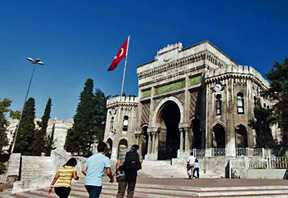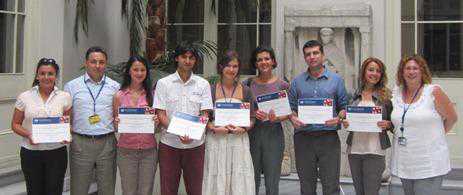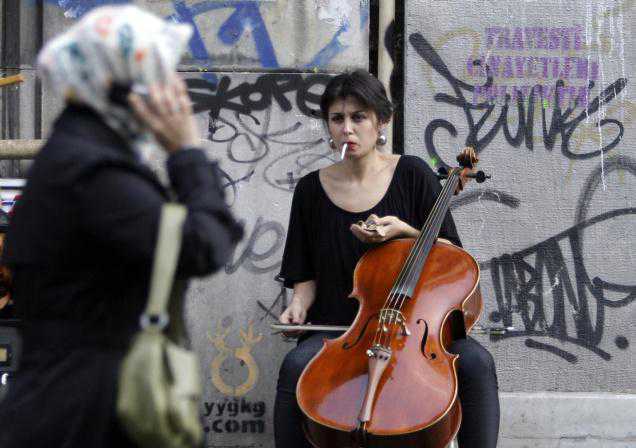Turkey simplifies scholarship application procedures, attracts students from across the region.
By Klaudija Lutovska for Southeast European Times in Skopje — 11/04/13

Many students from the Balkans are studying on scholarships at Turkish universities. [University of Istanbul]
The availability of scholarships and an easy online application process have led an increasing number of university students from the Balkans to pursue their studies in Turkey.
There are more than 35,000 foreign undergraduate and postgraduate students at Turkey’s universities, including 13,000 on scholarships.
Zivko Gacovski, dean of the Faculty of Veterinary Medicine at St. Kliment Ohridski University in Bitola, said students are showing great interest in the Turkish scholarship programme. He added that the university will benefit as well, citing plans to partner with the veterinary programme at Uludag University in Bursa, Turkey.
“Soon we will officially visit Turkey to sign a memorandum for bilateral co-operation, with which we will begin exchanging experiences, faculty and jointly working on projects. This is of great value for the development of our school, which began three years ago. It will strengthen instruction and scientific programmes, as well as the school’s capacity,” Gacovski said.
Sein Cardak, Turkey’s Balkan co-ordinator for higher education, told SETimes that the scholarships total $450 (344 euros) per month for undergraduates and $575 (440 euros) per month for doctoral students. The scholarships also cover two meals per day, health insurance and transportation costs.
There are 500 courses of study available at 175 Turkish universities. Students also are able to obtain a free year of instruction in the Turkish language in addition to their chosen course work.
“The amount of the scholarship is the most attractive part of this offer,” Cardak said.
Turkey annually provides 4,000 grants to students from 150 different countries. Last year, scholarships totaled $1.2 billion (917 million euros).
“In Turkey, we have a quote that says, ‘If my neighbour does not have money for food, I can’t sleep.’ This is a symbol of our character,” Cardak said.
Rector Zlatko Zhoglev (left) and Macedonian Minister of Education Pance Kralev (second from left) participate in the diploma celebration for law faculty students at the University St. Kliment Ohridski in Bitola. [Klaudija Lutovska/SETimes]
Students from Albania, Bosnia and Herzegovina (BiH), Bulgaria, Croatia, Montenegro, Kosovo, Serbia, Slovenia and Greece are currently on scholarships in Turkey.
Adem Gunaydin, a co-ordinator with the Turkish scholarship programme, said 80 students from BiH will continue their education in Turkey during the 2013-14 academic year. This year’s application period for master’s and doctoral scholarships closed on March 31st, but undergraduate students can apply via the internet starting in May.
Previously, an entrance exam was required, but it was abolished last year. Selected applicants will be invited to an interview in Sarajevo, after which a list of scholarship recipients will be announced.
Merisa Sultanovic, a 22-year-old student from BiH, said she found out about Turkish scholarships on the internet.
“I study economics in Turkey, a country with a remarkably developed economy,” she told SETimes. “I expect to take the experience and knowledge gained here back to BiH.”
Students from Turkey also pursue studies in the Balkans. Macedonia welcomes more than 300 Turkish students a year, and there are Turkish students at universities in Bulgaria and BiH.
Ankara University students will be able to continue studying at the University of Bitola under a recent agreement.
“There is a group of students from Turkey who have completed two years of high school, and they want to come here to complete a further three years to gain a college degree, especially in the sciences or electrical engineering,” Zlatko Zhoglev, rector at the University of Bitola, told SETimes.
“Collaboration will happen even in the field of philological sciences. There is interest in Macedonia to open a department of Turkish language. Their centre for Turkish language in Ankara is one of the strongest.”
Prospective students can apply for Turkish university scholarships at www.turkiyeburslari.gov.tr and www.trscholarships.org .
What advantages do you think a Turkish university education would provide? Share your thoughts in our comment section.
This content was commissioned for SETimes.com.
via Balkan students, universities benefit from Turkish scholarships (SETimes.com).





